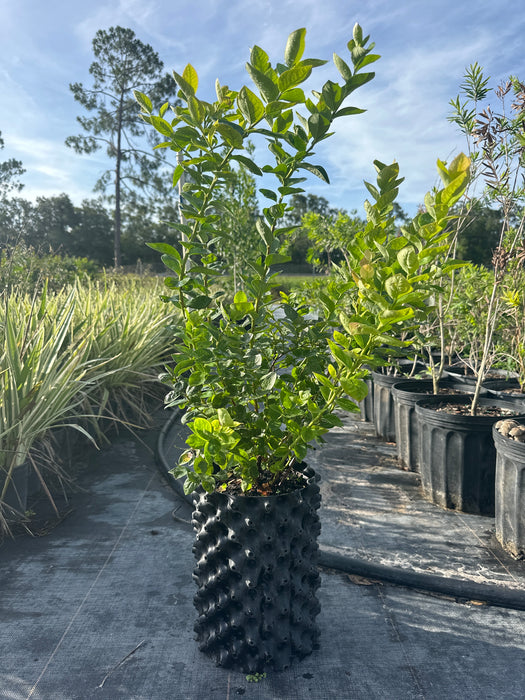
Emerald Blueberry
Emerald Blueberry Overview
- Emerald: A low-chill, tetraploid hybrid that can tolerate 50–200 hours of chill and can be grown past zone 9. It's a moderate grower that can reach a height of 5–6 ft and a width of 4–6 ft, and produces large, sweet berries that are good for snacking, baking, or smoothies. Emerald plants are also disease resistant and have evergreen qualities, making them a good landscaping choice
Taste
The Emerald Blueberry is known for its exceptionally sweet flavor with a hint of tartness, making it a favorite for fresh eating, baking, and preserves. The berries are large, firm, and have a pleasing texture that makes them highly desirable for culinary use. This cultivare
Best Growing Environment
Emerald Blueberries thrive in well-drained, acidic soils with a pH between 4.5 and 5.5. They prefer sandy or loamy soil types and benefit from organic matter, such as peat moss or compost, mixed into the soil. A sunny location with good air circulation is ideal, as it helps prevent diseases and promotes healthy growth.
Common Names
- Emerald Blueberry
- Vaccinium corymbosum 'Emerald'
Average Height
Emerald Blueberry bushes typically reach an average height of 5 to 6 feet (1.5 to 1.8 meters) at maturity.
Growth Rate
Emerald Blueberries have a moderate growth rate. Under optimal conditions, they can achieve their full height within 4 to 6 years.
Sun Requirements
Full sun is essential for the best fruit production and plant health. Emerald Blueberries require at least 6 to 8 hours of direct sunlight each day.
Cold Hardiness
Emerald Blueberries are hardy in USDA zones 7 to 10. They can tolerate temperatures down to about 10°F (-12°C), but may require protection from frost in the colder parts of their range.
Water Requirements
Consistent moisture is crucial for Emerald Blueberries, especially during the fruiting period. They require about 1 to 2 inches (2.5 to 5 cm) of water per week, either from rainfall or supplemental irrigation. Mulching around the base of the plants can help retain moisture and reduce weed competition.
Planting Guide
- Site Selection: Choose a location with full sun and well-drained, acidic soil.
- Soil Preparation: Amend the soil with organic matter and ensure the pH is between 4.5 and 5.5.
- Planting Time: The best time to plant Emerald Blueberries is in early spring or fall.
- Planting Depth: Dig a hole twice as wide and the same depth as the root ball. Place the plant in the hole, spreading the roots out.
- Backfilling: Fill the hole with soil, gently tamping it down to eliminate air pockets. Water thoroughly.
- Mulching: Apply a 2 to 4-inch layer of mulch around the base of the plant to conserve moisture and suppress weeds.
- Spacing: Space plants about 4 to 5 feet apart to allow for proper air circulation and growth.
Fertilizing Schedule
- Early Spring: Apply a balanced fertilizer, such as 10-10-10, at a rate of 1 to 2 pounds per 100 square feet. This supports early growth and fruit set.
- Mid-Summer: Apply a second dose of balanced fertilizer to encourage continued growth and fruit development.
- Fall: Avoid fertilizing in the fall to prevent stimulating new growth that could be damaged by frost.













